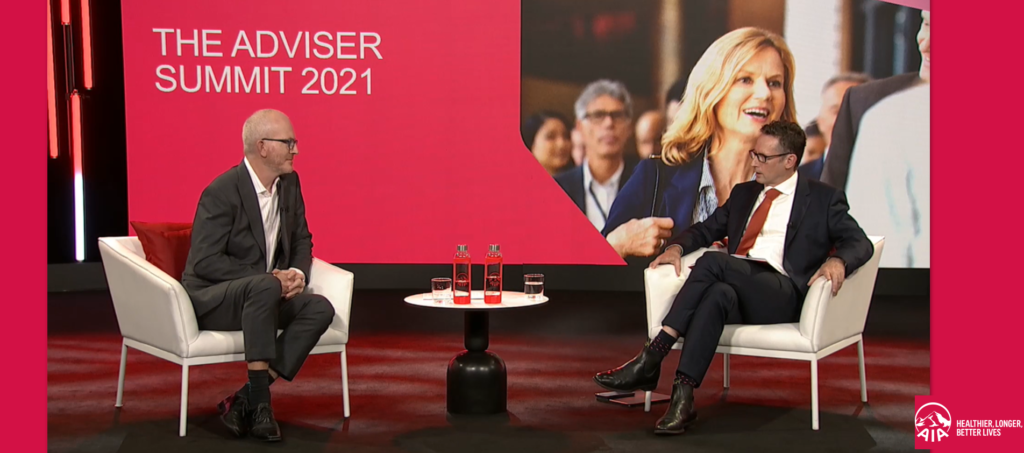A contrasting approach towards the validity of risk commissions appeared to be reinforced at this week’s AIA Australia Adviser Summit.
Day One of the three-day virtual event included opportunities for both the Government and the Labor Opposition to present their case on life industry and advice-related issues of the day and to engage with questions put to their representatives by advisers from around the country.
Representing the Opposition’s perspective was Shadow Assistant Treasurer and Shadow Minister for Financial Services, Stephen Jones, who told the summit audience that he has always held the view that “…conflicted remuneration is a problem.”
Jones’ statement this week is consistent with the position he outlined at the 2020 AFA Vision Conference, at which he noted “The provision of advice must be decoupled from the sales process which means the prohibition of commissions (however so described) from product manufacturers to advisers” (see: ALP Inclined to Ban Risk Commissions).

Jones added this week, however, that if risk advisers can make a case as to why his starting position is wrong “..I will listen to it but I will not make a decision on any of those things ahead of the ASIC review.”
As to what the alternatives may be, Jones pointed to legal and accountancy fees and said that within the advice sector a fee-for-service model will be increasingly a part of the business model for financial advice.
Contrasting with the Opposition’s position, former financial adviser and Queensland Coalition MP, Bert van Manen, told the AIA Adviser Summit audience that he supports commission as a valid remuneration option for life insurance advice.

van Manen was asked whether he saw a future for risk commissions and if not, what sort of alternatives will keep advice accessible.
He made it clear that he does not have a problem with commissions and thinks they are a perfectly valid form of remuneration, noting that a number of industries have a commission model and that insurance in particular should not be exempted from that.
He added that, from his perspective, the issue is that the industry needs to focus on strategic advice, rather than on the product side of the equation:
“If the strategic advice isn’t correct for the client, the product may not do its job and may not be appropriate for the client’s circumstances,” he said.
van Manen also noted the example of the total removal of risk commission in the Netherlands, which he says demonstrates that if the life insurance area moved to fee-based structure, “…people are not going to pay that.”
“We know already that there is a resistance to people paying fees for advice for insurance so we need to make sure there’s a remuneration model in place so that advisers get paid for the very important work they do and commission is a key part of that,” he said.





Stephen Jones is so out of touch, why does he think clients will pay for their premiums and pay an adviser for the set up…… he is dreaming and the advisers out there that say they do it everytime….Im sorry but you are a investment adviser moonlighting as a risk writer to justify your own ridulous fee model. The ones that purely focus on risk know a client will buy a inferior product direct from iselect! why would they pay a fee – to pay a premium…. You dont have to agree but its reality…. I feel sorry for clients these days as they are lead to believe all advisers are crooks, which is not the case at all.
I watched Steven Jones’ comments yesterday with utter rage and disbelief and agree with you ‘Also Stunned’. Is he still living in a world of horse and carts?
Insurance commissions were capped 4-5 years ago and are now at an all time low for advisers WHERE EVER you place your clients business – which is a miserable 66% (10% of that going to the Government of course as GST).
Furthermore, Best Interest Duty really does force advisers to now recommend what’s best for their clients so advisers really can’t even recommend the most expensive policy out there to try and make a few extra dollars to cover their excessive business costs.
In response to his ludicrous comment that “Where an adviser receives commission from an insurer, its conflicted advice and remuneration” – how and why does he possibly believe this still with all that said?
Furthermore, HE says he wants to close the gap between affordable advice to wealthy and poor Australians but wants to introduce fee for service in the same breath! That will do the exact opposite to what he says he wants.
The Federal electorate of Whitlam, where Jones is an MP, needs to be represented by a Liberal Minister at the next federal election and the entire electorate bombarded with information about his backward ideas. He’s part of the problem Australia now has with underinsurance…not the solution and is a real worry for our industry if he ever gets into power.
He’s clearly stubborn and close-minded to what will work and what a socialist Labor Govt really wants….which is to feather the nests of industry superfunds.
agree 100%
The elephant in the room for Stephen Jones and all those who advocate a fee only model is what happens when an application is declined by the insurer? Currently, as a risk only adviser, I pool my non-completion risk across my client base. I’ve had clients decline to pay a (loss leader) $770 statement of advice fee so I could deliver a $700 IP contract. Not sure how I’m going to deliver an $2500 plus invoice when the insurer declines an application. Stephen – what does your model say on that subject?
Riskinfo welcomes and values all comments made by advisers and other contributors in response to our articles – comments which either support or reject the arguments being presented in the articles we publish. While we accept numerous debates may become robust in their nature, our default position is to censor comments as little as possible. However, we will step in when comments denigrate or disrespect others.
Editor
I literally stated a fact that your website has published: people are not willing to pay for risk advice but somehow you feel the need to censor.
Comments are closed.